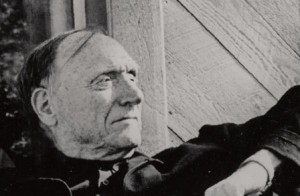The used bookstore where I spent a fair amount of money in the last 20 years has moved locations, forced to vacate the 19th century farmhouse to make way for a storage facility. Its future was uncertain, but in the past week it reopened in a storefront two miles to the east.
I’m glad it’s survived, but I’ll miss the old poetry nook, nestled as it was in a small, sloped-ceiling room in the gable above the main door and filled with poets and poems. You have to bend over to make it through the small door leading to the poetry books, and once inside (two people was a major crowd), you couldn’t stand unless bent over. It was easier to sit on the floor, peruse the books and keep an eye on the black cat asleep on the pillow, inspired, no doubt, by T.S. Eliot.
One volume I found in the nook was a first edition of Robert Penn Warren’s Selected Poems 1923-1975 in hardback and priced at $14.50. You pick up a book like this and experience a flood of memories.
It was difficult to attend LSU when I did and not know about Robert Penn Warren. He had taught at LSU from 1933 to 1945 (24 years before my freshman year), and he had cast a long literary and professional shadow. Co-founder of the Southern Review (1935, with Cleanth Brooks). Consultant in poetry for the Library of Congress 1944-45 (what we call poet laureate today). Winner of the Pulitzer Prize for fiction in 1947 (All the King’s Men, based on the life of Huey Long). Winner of the Pulitzer Prize for poetry in 1958 (Promises: Poems). One of the Southern Agrarians who led the revival of Southern literature and what came to be known as the Southern Renaissance. My freshman year, T. Harry Williams, the head of LSU’s history department, won the Pulitzer Prize and the National Book Award for his biography Huey Long, which rekindled interest in Warren’s novel of two decades earlier.

His Selected Poems: 1923 – 1975, the volume I discovered in the poetry nook at the used bookstore, is something of an oddity—organized in reverse chronological order, with the earliest poems at the back. And so you read backwards, at least in the sense of reading Warren’s literary output from the most recent to the early poems.
What’s fascinating is that the early poems demonstrate the same maturity as the later poems, as if he started writing poetry at the height of his game and remained there.
The poems are eclectic, what you would expect from covering a period of more than 50 years. He pays homage to Theodore Dreiser and Ralph Waldo Emerson. He writes about life in Vermont (where he lived for the last part of his life and where he’s buried), a grandfather clock, a Confederate veteran trying to explain the Civil War, and ornithology. He includes ballads and love poems, and even a short story told in verse. Eclectic, yes, but they all share precision in the words and the fine crafting by a master poet.
One of my favorite poems in the collection is “Ransom, ” published in the 1920s:
Old houses, and new-fangled violence;
Old bottles but new wine, and newly spilled.
Doom has, we know, no shape but the shape of air,
That much for us the red-armed augurs spelled,
Or flights of fowl lost early in the long air.
The mentioned act: barbarous, bloody, extreme,
And fraught with bane. The actors: nameless and
With faces turned (I cannot make them out).
Christ bled, indeed, but after fasting and
Bad diet of the poor; wherefore thin blood came out.
What wars and lecheries! And the old zeal
Yet unfulfilled, unrarefied, unlaced.
At night the old man coughs: thus history
Strikes sum, ere dawn in rosy buskins laced
Delivers cool with dew the recent news-story.
Defeat is possible, and the stars rise.
Our courage needs, perhaps, new definition.
By night, my love, and noon, infirm of will
And young, we may endeavor definition;
Though frail as the clasped dream beneath the blanket’s wool.
Robert Penn Warren indeed endeavored definition and helped shape American literary life for more than 60 years.
Image by higetiger. Sourced via Flickr. Post by Glynn Young, author of the novels Dancing Priest and A Light Shining, and the just-published Poetry at Work (T. S. Poetry Press).
__________________
Want to brighten your morning coffee?
Subscribe to Every Day Poems and find some beauty in your inbox.
- Longfellow’s “Paul Revere’s Ride”: Creating a National Legend - April 17, 2025
- Poets and Poems: Katie Kalisz and “Flu Season” - April 15, 2025
- Poets and Poems: Michelle Ortega and “When You Ask Me, Why Paris?” - April 10, 2025

Megan Willome says
Thanks, Glynn. I love this line of the poem of Warren’s you posted: Defeat is possible, and the stars rise. “Defeat is possible, and the stars rise.”
Maureen Doallas says
One could spend a long time talking about the poem you feature. I especially favor its concluding line.